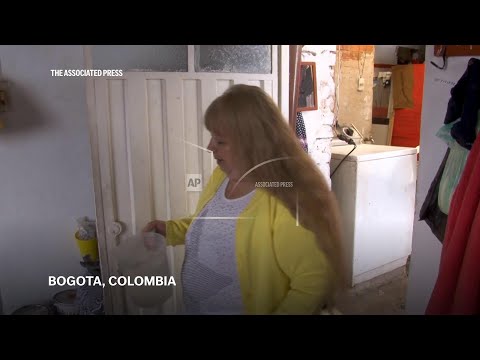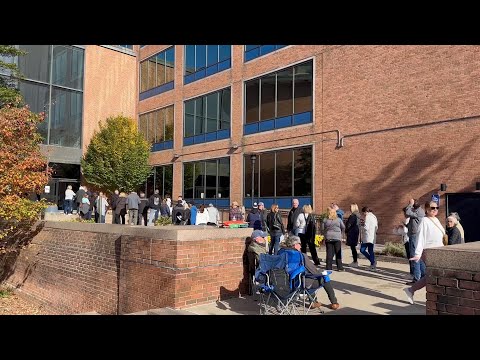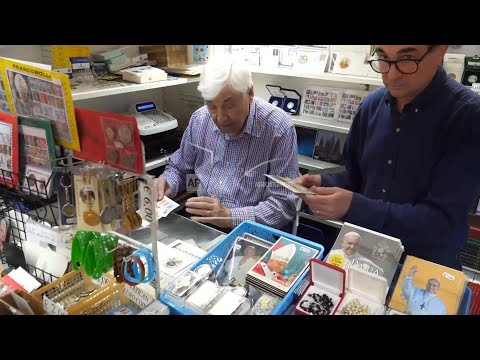(11 Apr 2025)
RESTRICTION SUMMARY:
ASSOCIATED PRESS:
Bogota, Colombia – 10 April 2025
1. Local resident, Lidia Rodríguez, filling up container with water stored in large pots
2. Rodríguez carrying container filled with water
3. Various of Rodríguez washing dishes
4. SOUNDBITE (Spanish) Lidia Rodríguez, local resident: ++STARTS ON SHOT 3++
++STARTS IN SHOT 3++
"I hope it’s over now because this is karma for us. When there’s no water, it’s a dreadful thing. Terrible."
5. Woman taking water from pot
6. Woman washing dishes
7. SOUNDBITE (English) Gregory Pierce, Director of the Human Right to Water Solutions Lab at the University of California:
"That ability to go out and get new sources easily is not as prevalent. And of course, we have climate change making it, you know, harder and making water scarcer overall."
8. Various of woman taking water from pots for cooking
9. Aerial shot of city ++MUTE++
STORYLINE:
Nestled among cloud-kissed Andean peaks and known for its steady rainfall, Colombia’s capital once seemed immune to water scarcity.
But that sense of security vanished as an unrelenting drought drained Bogota’s reservoirs to historic lows, forcing authorities a year ago to ration water for the first time in more than four decades.
More than 8 million people in the city and 11 surrounding municipalities have been subject to 24-hour water shutoffs every nine days.
Households and businesses had to adjust by storing water in advance and cutting daily consumption.
Bogotá’s mayor, Carlos Fernando Galan, announced Friday that the city’s water rationing will end Saturday, saying the crisis has been resolved thanks to improved rainfall, effective conservation efforts, and the expansion of a treatment plant that eased demand on the reservoirs, which had fallen to record lows last year.
“We know that it was a very difficult year, very complex for everyone, which affected the quality of life of local residents,” Galan said.
But the year-long rationing is a stark reminder of how climate extremes are reshaping urban life — and a warning for other cities facing mounting water stress amid rising global temperatures.
"When there’s no water, it’s a dreadful thing. Terrible," Bogota resident Lidia Rodríguez said.
Bogota’s experience is not unique. The city of Sao Paulo in Brazil also took drastic water-saving measures due to drought, as did Cape Town, in South Africa, which due to a drought starting in 2015, came dangerously close to running out of water entirely.
"That ability to go out and get new sources easily is not as prevalent. And of course, we have climate change making it, you know, harder and making water scarcer overall," said Gregory Pierce, director of the Human Right to Water Solutions Lab at the University of California.
In Bogota, officials have promoted conservation through public messaging.
In one now-famous appeal, the mayor encouraged residents to “shower together” to save water.
Bogota is now also studying its groundwater potential, having relied until now almost entirely on rain-fed reservoirs.
AP video shot by: Samuel Sotomayor
===========================================================
Clients are reminded to adhere to all listed restrictions and to check the terms of their licence agreements. For further assistance, please contact the AP Archive on: Tel +44(0)2074827482 Email: info@aparchive.com.
Find out more about AP Archive: http://www.aparchive.com/HowWeWork
Twitter: https://twitter.com/AP_Archive
Facebook: https://www.facebook.com/APArchives
Instagram: https://www.instagram.com/APNews/
You can license this story through AP Archive: http://www.aparchive.com/metadata/youtube/fdfa7711a3c043aea63b28ad75207379
Author: AP Archive
Go to Source
News post in April 16, 2025, 6:05 pm.
Visit Our Sponsor’s:
News Post In – News





